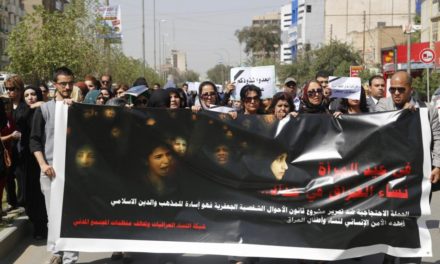My father once took me to visit Al-Ghazil bazaar in the center of Baghdad in the 1980s. The bazaar for those who do not know is mainly for pets and active only on Fridays. My first and only visit more than three decades ago is engraved in my memory, holding my father’s hand, him trailblazing through the crowd on the narrow sidewalk adjacent to the Al-Khulafa Mosque right in the middle of Al-Jumhuriya Street (Republic Street). For me, it was the first time I see animals such as dogs, cats, and birds displayed in the open and valued as domestic pets. Our society was and still at a certain point frowns upon keeping and caring for dogs and cats as pets. And here we have a pet market at the heart of Baghdad operating since the 50’s! This bazaar was and is still unique in the Middle East region especially if you try to imagine the region in the 1950’s, the birth decade of this bazaar.

(Al-Khulafa Mosque and Al-Ghazil bazaar in the late 1980s)
I had planned to visit the market on my first Friday in Iraq and decided to take my children with me in the hope that I would recreate the same long-lasting memory. Heading to the heart of Baghdad through the famous Al-Hurriya Square (Freedom Square) and since Al-Jumhuriya street leading to the market is closed (for pedestrians only), we crossed the river to the other bank and parked the car in a paid parking behind the old British Embassy. Crossing back to the opposite side is easier through a small boat with one operator (river taxi). Our boat operator was a young man who looked 16 years old.
Arriving at the beginning of Al-Jumhuriya Street, I was over the moon to see that the Bazar has expanded from the small narrow pavement in the middle to occupy the whole street. Walking through the masses of humans and animals, your senses are attacked from all sides, especially the ears picking up the symphony produced by all the noise.This market, despite five deadly attacks resulting in more than 80 deaths, continues to thrive, becoming a weekly event in itself.
The question remains, who is really behind the attacks and what is the purpose of killing those kind and innocent animal lovers not belonging to any particular sect or political group?
We moved through the market frequently stopping at the various stalls and chatting to owners of animals. I was happy to note that the animals, in general, were fairly treated. I did not see a dog in a crate, for example, and owners seemed to care for their animals genuinely. Strangely enough, I did not feel a threat of pickpocketing, I just thought that the type of people in the bazaar was not that kind. I could be wrong or naïve, but I choose to keep this feeling.

Arriving at the historical Al-Khulafa mosque, I noticed as if for the first time the Church of Our Lady of the Virgin Mary, which was built almost 400 years ago on the opposite side of the street, and suddenly noticed the uniqueness of the scene. In a single frame, you have a mosque and a church facing each other peacefully for hundreds of years and today are separated by a unique market that brings people of all races and religions together. Perhaps this is what the attackers wanted to destroy: this recurring oasis of complete harmony every week for more than 60 years without interruption, in a real reflection of Iraqi mosaic.
Returning to our young boat operator, the neither unwritten nor advertised boat fare is 250 dinars (20 cents) per person; we were four so in total a 1000 dinars (80 cents). My father in law tried to handover 1500 dinars (1.3 dollars) asking if it is enough or should he pay more (out of courtesy) and the young man respond objectionably that it is too much and only accepted after a couple of attempts. Again, for them, this is a natural everyday way of dealing while for me I cannot help thinking why someone who was clearly living on day by day basis and below the poverty line did not exploit us? We look like tourists with our clothes and dangling camera, he goes further and objects to being paid a tip! I think I have visited too many tourists trap countries to understand.

Ahmed Shariefi
Ahmed Shariefi is an Iraqi born professional who lived through the Iraq-Iran War as a child and Gulf War as a teenager. He left Iraq in 1996 to the U.K. and is currently in Qatar.










